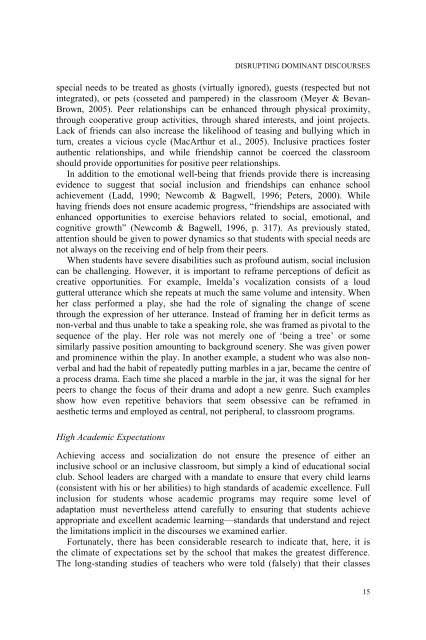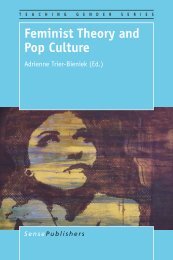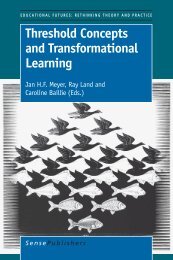Leadership for Inclusion
577-leadership-for-inclusion
577-leadership-for-inclusion
- No tags were found...
You also want an ePaper? Increase the reach of your titles
YUMPU automatically turns print PDFs into web optimized ePapers that Google loves.
DISRUPTING DOMINANT DISCOURSES<br />
special needs to be treated as ghosts (virtually ignored), guests (respected but not<br />
integrated), or pets (cosseted and pampered) in the classroom (Meyer & Bevan-<br />
Brown, 2005). Peer relationships can be enhanced through physical proximity,<br />
through cooperative group activities, through shared interests, and joint projects.<br />
Lack of friends can also increase the likelihood of teasing and bullying which in<br />
turn, creates a vicious cycle (MacArthur et al., 2005). Inclusive practices foster<br />
authentic relationships, and while friendship cannot be coerced the classroom<br />
should provide opportunities <strong>for</strong> positive peer relationships.<br />
In addition to the emotional well-being that friends provide there is increasing<br />
evidence to suggest that social inclusion and friendships can enhance school<br />
achievement (Ladd, 1990; Newcomb & Bagwell, 1996; Peters, 2000). While<br />
having friends does not ensure academic progress, “friendships are associated with<br />
enhanced opportunities to exercise behaviors related to social, emotional, and<br />
cognitive growth” (Newcomb & Bagwell, 1996, p. 317). As previously stated,<br />
attention should be given to power dynamics so that students with special needs are<br />
not always on the receiving end of help from their peers.<br />
When students have severe disabilities such as profound autism, social inclusion<br />
can be challenging. However, it is important to reframe perceptions of deficit as<br />
creative opportunities. For example, Imelda’s vocalization consists of a loud<br />
gutteral utterance which she repeats at much the same volume and intensity. When<br />
her class per<strong>for</strong>med a play, she had the role of signaling the change of scene<br />
through the expression of her utterance. Instead of framing her in deficit terms as<br />
non-verbal and thus unable to take a speaking role, she was framed as pivotal to the<br />
sequence of the play. Her role was not merely one of ‘being a tree’ or some<br />
similarly passive position amounting to background scenery. She was given power<br />
and prominence within the play. In another example, a student who was also nonverbal<br />
and had the habit of repeatedly putting marbles in a jar, became the centre of<br />
a process drama. Each time she placed a marble in the jar, it was the signal <strong>for</strong> her<br />
peers to change the focus of their drama and adopt a new genre. Such examples<br />
show how even repetitive behaviors that seem obsessive can be reframed in<br />
aesthetic terms and employed as central, not peripheral, to classroom programs.<br />
High Academic Expectations<br />
Achieving access and socialization do not ensure the presence of either an<br />
inclusive school or an inclusive classroom, but simply a kind of educational social<br />
club. School leaders are charged with a mandate to ensure that every child learns<br />
(consistent with his or her abilities) to high standards of academic excellence. Full<br />
inclusion <strong>for</strong> students whose academic programs may require some level of<br />
adaptation must nevertheless attend carefully to ensuring that students achieve<br />
appropriate and excellent academic learning—standards that understand and reject<br />
the limitations implicit in the discourses we examined earlier.<br />
Fortunately, there has been considerable research to indicate that, here, it is<br />
the climate of expectations set by the school that makes the greatest difference.<br />
The long-standing studies of teachers who were told (falsely) that their classes<br />
15




